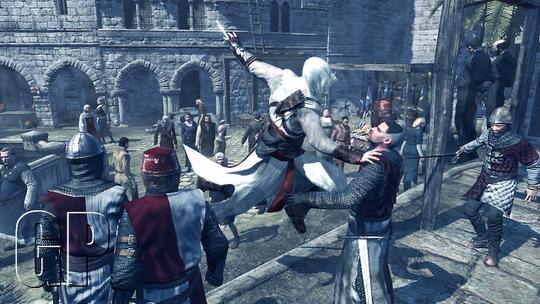But let's get back on track. Today, I wanted to talk about Metal Gear Solid and its significance in the bigger picture of video games.
Yes, us PC gamers apparently aren't good enough for Hideo Kojima's works of godliness (I say "godliness" because apparently they are, judging by the raves from critics of past), and although there was one port of an MGS, the ultra-magnus opus that is Metal Gear Solid 4 should've been multi-platform.
With the recent news of the upcoming MGS: Rising coming to Xbox, PS3, and PC, I downloaded a few of the cutscenes from MGS 4 to get up to speed with the story. I've heard all about the flamboyant, over-the-top and lengthy cutscenes that were a testament to Kojima's brain. They were indeed quite kick-ass in that kooky kinda' way. And they broke the fourth-wall so subtly for the audience - like when Otacon would instruct Solid Snake on accessing an in-game menu system by pressing "start".
"WTF? Why does Solid Snake have a PS3 controller on his communication headset?"

It is the trend nowadays for games and movies to strive for realism so as to give the audience the most immersive experience ever. James Bond now kicks ass with his fists and skills rather than futuristic gadgetry, Armed Assault 2 sees you taking cover more often than running and gunning ala Rambo. But never forget that at the end of the day, these are games and films, and by making the audiences aware of the medium, they can become more Brechtian in their play/view.
For those who don't know what "Brechtian" means, it's a term coined by Brecht, a theatre wiz of old who decided that in order for audiences to understand a narrative, character, or scene better, they must have an objective standpoint. And to do this, they must be removed somewhat from the theatre - thereby making them aware of the medium. But I guess "breaking the fourth wall" takes this one step further by actually having the actors on screen, the characters of this other world actually talk directly at the audience.
It becomes particularly interesting a concept in third-person games, like MGS. You see, originally, the theory behind the third-person perspective in video games is an appeal to the narcciscist within gamers. When you control Lara Croft, Altair, or even Solid Snake, by being able to see the character, you are not only him/her, you are also objectively admiring the character as they go through the motions and actions.

Why is breaking the fourth wall interesting in relation to third-person games? Well, it raises the question, who is playing? Are the in-game protagonists redundant with the replacement of the player protagonist, since you are being referred to.
Games like Diablo 2 or Titan Quest, when your inventory gets full or you aren't able to use something, the heroes go "Not enough mana", or "Inventory full". Who do you think they are talking to? The zombies? Demons?

Self-referencing. Acknowledging the player's presence, and in a strange way, it actually draws you into the game as opposed to create detachment. It makes the experience a lot more realized. It also works as a convenient function to "lead" players on - like when your Sims characters wave at you to get your attention to things they want. Things sparkle in Resident Evil to tell you that it's pick-up-able.
I don't really have a conclusion. But instead of the usual rambling on about this game or that, it's nice once in awhile to look deeper into the mechanics and theory behind video games. Unfortunately, breaking fourth wall is a feature more commonly found with children's games where the characters on screen talk directly to the kids in solving puzzles/playing games/etc. With us mature folks, we like our games real, immersive, and experiential.

But once in awhile, I'd like my Sim to thank me directly for buying a nice piece of furniture for their little house.








No comments:
Post a Comment